Healthcare Ethics: An Analysis of Abortion and Moral Considerations
VerifiedAdded on 2023/04/23
|6
|1461
|147
Essay
AI Summary
This essay delves into the ethical complexities of abortion, examining the arguments presented by philosopher Judith Jarvis Thomson. It begins by defining abortion and differentiating between spontaneous miscarriage and induced abortion. The paper then analyzes Thomson's philosophical thought experiments, including the violinist analogy, the trapped mother analogy, and the people-seeds analogy, to evaluate the moral permissibility of abortion. The discussion highlights Thomson's view that a fetus's right to life should not supersede the mother's right to her own body and autonomy. The essay supports the idea that the mother's decision regarding abortion should be respected, especially in cases of lethal pregnancy. The conclusion emphasizes that abortion should be considered the mother's right, particularly in situations where the fetus is comparable to a collection of cells, defending abortion as a justified choice in various circumstances while acknowledging the moral complexities and ethical considerations related to abortion, drawing on Thomson's arguments and examples to provide a nuanced perspective on this contentious issue.
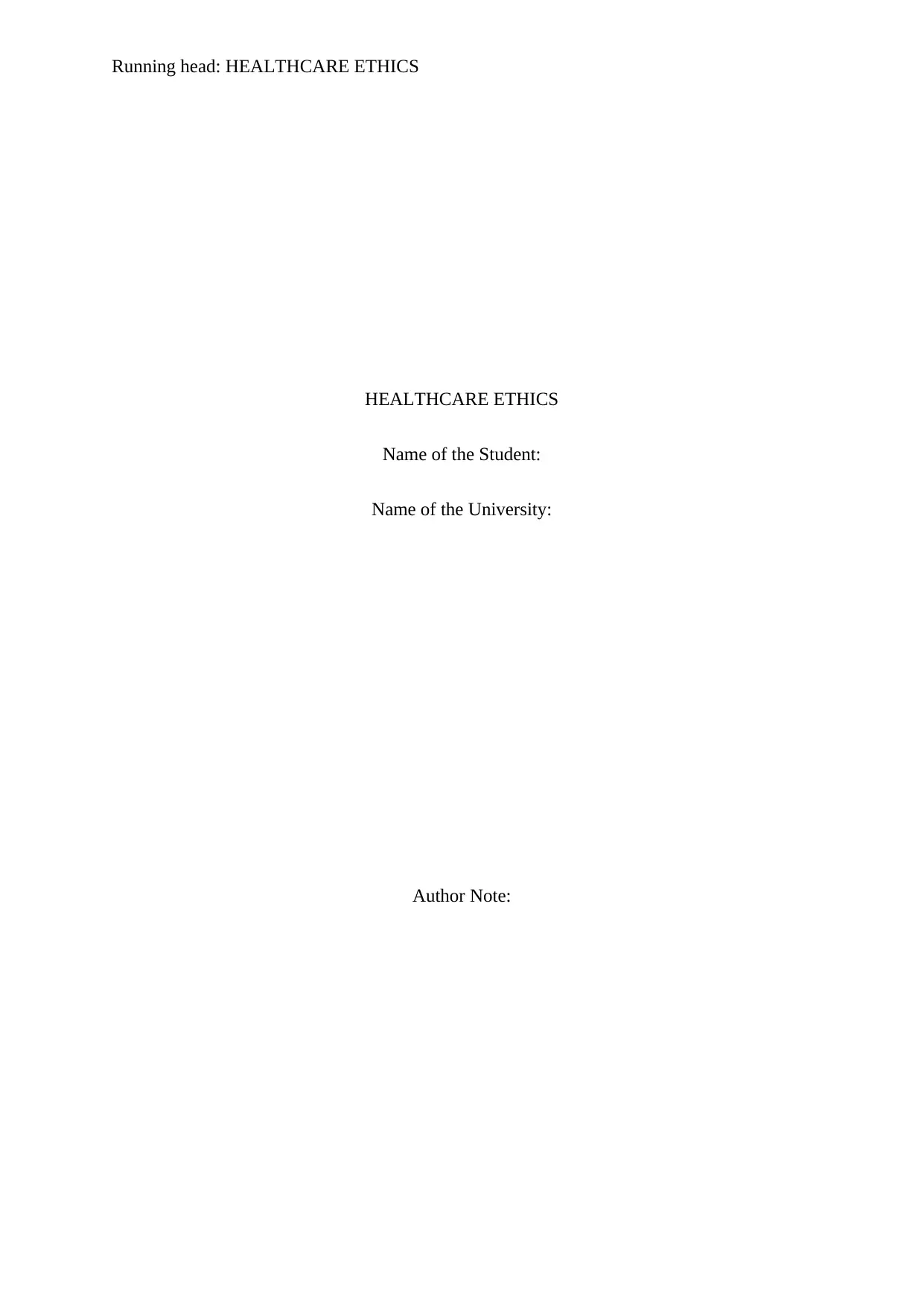
Running head: HEALTHCARE ETHICS
HEALTHCARE ETHICS
Name of the Student:
Name of the University:
Author Note:
HEALTHCARE ETHICS
Name of the Student:
Name of the University:
Author Note:
Paraphrase This Document
Need a fresh take? Get an instant paraphrase of this document with our AI Paraphraser
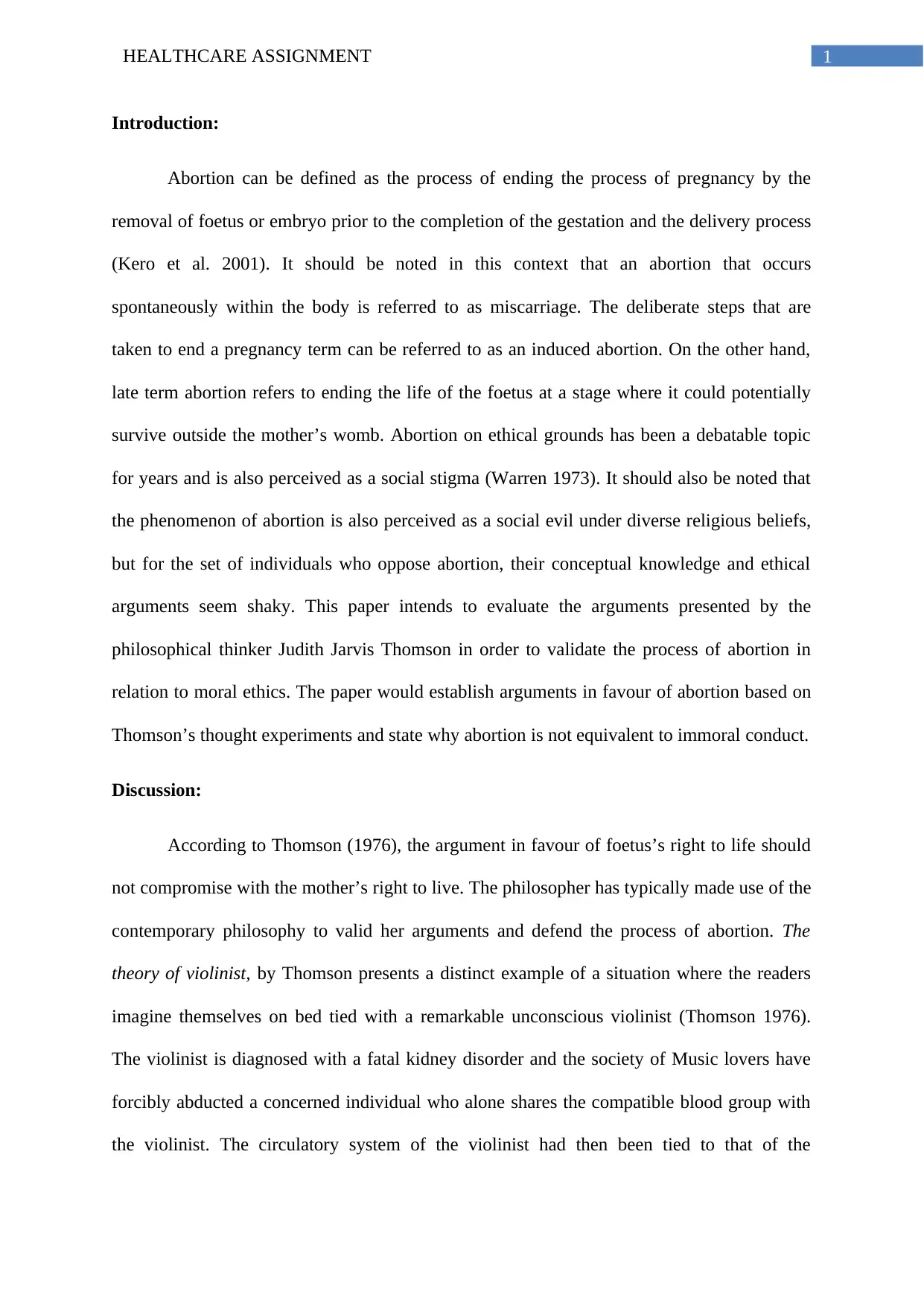
1HEALTHCARE ASSIGNMENT
Introduction:
Abortion can be defined as the process of ending the process of pregnancy by the
removal of foetus or embryo prior to the completion of the gestation and the delivery process
(Kero et al. 2001). It should be noted in this context that an abortion that occurs
spontaneously within the body is referred to as miscarriage. The deliberate steps that are
taken to end a pregnancy term can be referred to as an induced abortion. On the other hand,
late term abortion refers to ending the life of the foetus at a stage where it could potentially
survive outside the mother’s womb. Abortion on ethical grounds has been a debatable topic
for years and is also perceived as a social stigma (Warren 1973). It should also be noted that
the phenomenon of abortion is also perceived as a social evil under diverse religious beliefs,
but for the set of individuals who oppose abortion, their conceptual knowledge and ethical
arguments seem shaky. This paper intends to evaluate the arguments presented by the
philosophical thinker Judith Jarvis Thomson in order to validate the process of abortion in
relation to moral ethics. The paper would establish arguments in favour of abortion based on
Thomson’s thought experiments and state why abortion is not equivalent to immoral conduct.
Discussion:
According to Thomson (1976), the argument in favour of foetus’s right to life should
not compromise with the mother’s right to live. The philosopher has typically made use of the
contemporary philosophy to valid her arguments and defend the process of abortion. The
theory of violinist, by Thomson presents a distinct example of a situation where the readers
imagine themselves on bed tied with a remarkable unconscious violinist (Thomson 1976).
The violinist is diagnosed with a fatal kidney disorder and the society of Music lovers have
forcibly abducted a concerned individual who alone shares the compatible blood group with
the violinist. The circulatory system of the violinist had then been tied to that of the
Introduction:
Abortion can be defined as the process of ending the process of pregnancy by the
removal of foetus or embryo prior to the completion of the gestation and the delivery process
(Kero et al. 2001). It should be noted in this context that an abortion that occurs
spontaneously within the body is referred to as miscarriage. The deliberate steps that are
taken to end a pregnancy term can be referred to as an induced abortion. On the other hand,
late term abortion refers to ending the life of the foetus at a stage where it could potentially
survive outside the mother’s womb. Abortion on ethical grounds has been a debatable topic
for years and is also perceived as a social stigma (Warren 1973). It should also be noted that
the phenomenon of abortion is also perceived as a social evil under diverse religious beliefs,
but for the set of individuals who oppose abortion, their conceptual knowledge and ethical
arguments seem shaky. This paper intends to evaluate the arguments presented by the
philosophical thinker Judith Jarvis Thomson in order to validate the process of abortion in
relation to moral ethics. The paper would establish arguments in favour of abortion based on
Thomson’s thought experiments and state why abortion is not equivalent to immoral conduct.
Discussion:
According to Thomson (1976), the argument in favour of foetus’s right to life should
not compromise with the mother’s right to live. The philosopher has typically made use of the
contemporary philosophy to valid her arguments and defend the process of abortion. The
theory of violinist, by Thomson presents a distinct example of a situation where the readers
imagine themselves on bed tied with a remarkable unconscious violinist (Thomson 1976).
The violinist is diagnosed with a fatal kidney disorder and the society of Music lovers have
forcibly abducted a concerned individual who alone shares the compatible blood group with
the violinist. The circulatory system of the violinist had then been tied to that of the
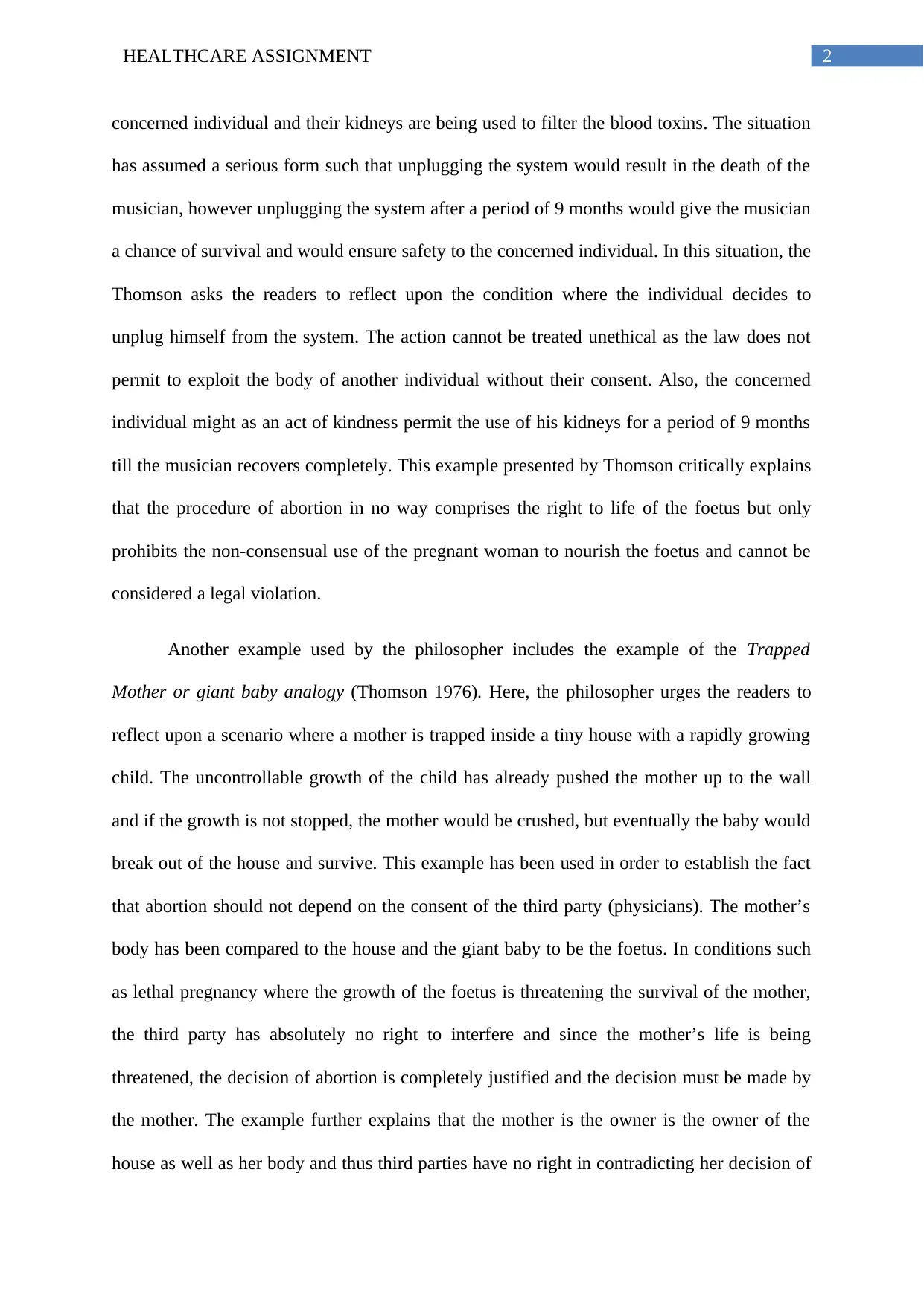
2HEALTHCARE ASSIGNMENT
concerned individual and their kidneys are being used to filter the blood toxins. The situation
has assumed a serious form such that unplugging the system would result in the death of the
musician, however unplugging the system after a period of 9 months would give the musician
a chance of survival and would ensure safety to the concerned individual. In this situation, the
Thomson asks the readers to reflect upon the condition where the individual decides to
unplug himself from the system. The action cannot be treated unethical as the law does not
permit to exploit the body of another individual without their consent. Also, the concerned
individual might as an act of kindness permit the use of his kidneys for a period of 9 months
till the musician recovers completely. This example presented by Thomson critically explains
that the procedure of abortion in no way comprises the right to life of the foetus but only
prohibits the non-consensual use of the pregnant woman to nourish the foetus and cannot be
considered a legal violation.
Another example used by the philosopher includes the example of the Trapped
Mother or giant baby analogy (Thomson 1976). Here, the philosopher urges the readers to
reflect upon a scenario where a mother is trapped inside a tiny house with a rapidly growing
child. The uncontrollable growth of the child has already pushed the mother up to the wall
and if the growth is not stopped, the mother would be crushed, but eventually the baby would
break out of the house and survive. This example has been used in order to establish the fact
that abortion should not depend on the consent of the third party (physicians). The mother’s
body has been compared to the house and the giant baby to be the foetus. In conditions such
as lethal pregnancy where the growth of the foetus is threatening the survival of the mother,
the third party has absolutely no right to interfere and since the mother’s life is being
threatened, the decision of abortion is completely justified and the decision must be made by
the mother. The example further explains that the mother is the owner is the owner of the
house as well as her body and thus third parties have no right in contradicting her decision of
concerned individual and their kidneys are being used to filter the blood toxins. The situation
has assumed a serious form such that unplugging the system would result in the death of the
musician, however unplugging the system after a period of 9 months would give the musician
a chance of survival and would ensure safety to the concerned individual. In this situation, the
Thomson asks the readers to reflect upon the condition where the individual decides to
unplug himself from the system. The action cannot be treated unethical as the law does not
permit to exploit the body of another individual without their consent. Also, the concerned
individual might as an act of kindness permit the use of his kidneys for a period of 9 months
till the musician recovers completely. This example presented by Thomson critically explains
that the procedure of abortion in no way comprises the right to life of the foetus but only
prohibits the non-consensual use of the pregnant woman to nourish the foetus and cannot be
considered a legal violation.
Another example used by the philosopher includes the example of the Trapped
Mother or giant baby analogy (Thomson 1976). Here, the philosopher urges the readers to
reflect upon a scenario where a mother is trapped inside a tiny house with a rapidly growing
child. The uncontrollable growth of the child has already pushed the mother up to the wall
and if the growth is not stopped, the mother would be crushed, but eventually the baby would
break out of the house and survive. This example has been used in order to establish the fact
that abortion should not depend on the consent of the third party (physicians). The mother’s
body has been compared to the house and the giant baby to be the foetus. In conditions such
as lethal pregnancy where the growth of the foetus is threatening the survival of the mother,
the third party has absolutely no right to interfere and since the mother’s life is being
threatened, the decision of abortion is completely justified and the decision must be made by
the mother. The example further explains that the mother is the owner is the owner of the
house as well as her body and thus third parties have no right in contradicting her decision of
⊘ This is a preview!⊘
Do you want full access?
Subscribe today to unlock all pages.

Trusted by 1+ million students worldwide
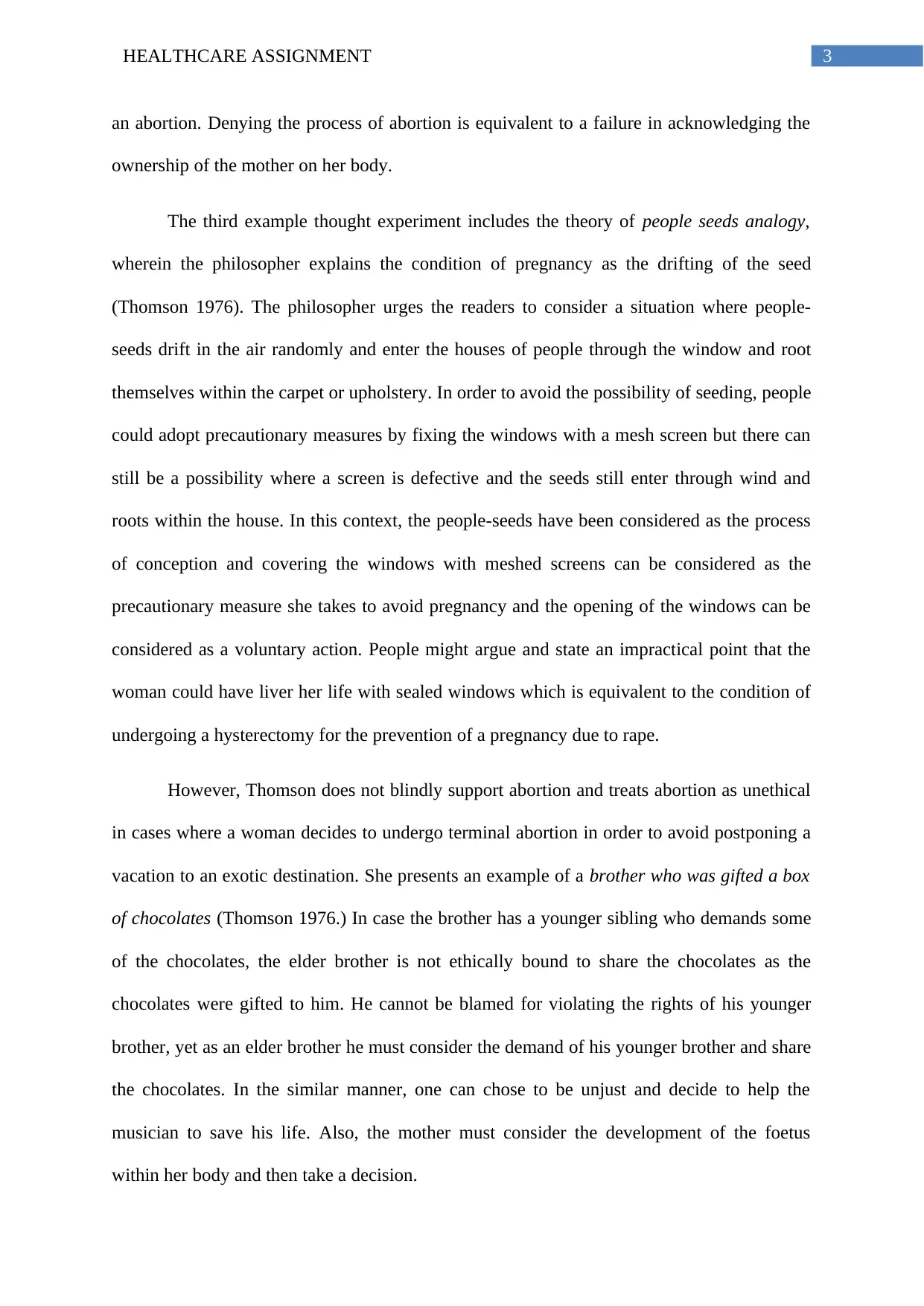
3HEALTHCARE ASSIGNMENT
an abortion. Denying the process of abortion is equivalent to a failure in acknowledging the
ownership of the mother on her body.
The third example thought experiment includes the theory of people seeds analogy,
wherein the philosopher explains the condition of pregnancy as the drifting of the seed
(Thomson 1976). The philosopher urges the readers to consider a situation where people-
seeds drift in the air randomly and enter the houses of people through the window and root
themselves within the carpet or upholstery. In order to avoid the possibility of seeding, people
could adopt precautionary measures by fixing the windows with a mesh screen but there can
still be a possibility where a screen is defective and the seeds still enter through wind and
roots within the house. In this context, the people-seeds have been considered as the process
of conception and covering the windows with meshed screens can be considered as the
precautionary measure she takes to avoid pregnancy and the opening of the windows can be
considered as a voluntary action. People might argue and state an impractical point that the
woman could have liver her life with sealed windows which is equivalent to the condition of
undergoing a hysterectomy for the prevention of a pregnancy due to rape.
However, Thomson does not blindly support abortion and treats abortion as unethical
in cases where a woman decides to undergo terminal abortion in order to avoid postponing a
vacation to an exotic destination. She presents an example of a brother who was gifted a box
of chocolates (Thomson 1976.) In case the brother has a younger sibling who demands some
of the chocolates, the elder brother is not ethically bound to share the chocolates as the
chocolates were gifted to him. He cannot be blamed for violating the rights of his younger
brother, yet as an elder brother he must consider the demand of his younger brother and share
the chocolates. In the similar manner, one can chose to be unjust and decide to help the
musician to save his life. Also, the mother must consider the development of the foetus
within her body and then take a decision.
an abortion. Denying the process of abortion is equivalent to a failure in acknowledging the
ownership of the mother on her body.
The third example thought experiment includes the theory of people seeds analogy,
wherein the philosopher explains the condition of pregnancy as the drifting of the seed
(Thomson 1976). The philosopher urges the readers to consider a situation where people-
seeds drift in the air randomly and enter the houses of people through the window and root
themselves within the carpet or upholstery. In order to avoid the possibility of seeding, people
could adopt precautionary measures by fixing the windows with a mesh screen but there can
still be a possibility where a screen is defective and the seeds still enter through wind and
roots within the house. In this context, the people-seeds have been considered as the process
of conception and covering the windows with meshed screens can be considered as the
precautionary measure she takes to avoid pregnancy and the opening of the windows can be
considered as a voluntary action. People might argue and state an impractical point that the
woman could have liver her life with sealed windows which is equivalent to the condition of
undergoing a hysterectomy for the prevention of a pregnancy due to rape.
However, Thomson does not blindly support abortion and treats abortion as unethical
in cases where a woman decides to undergo terminal abortion in order to avoid postponing a
vacation to an exotic destination. She presents an example of a brother who was gifted a box
of chocolates (Thomson 1976.) In case the brother has a younger sibling who demands some
of the chocolates, the elder brother is not ethically bound to share the chocolates as the
chocolates were gifted to him. He cannot be blamed for violating the rights of his younger
brother, yet as an elder brother he must consider the demand of his younger brother and share
the chocolates. In the similar manner, one can chose to be unjust and decide to help the
musician to save his life. Also, the mother must consider the development of the foetus
within her body and then take a decision.
Paraphrase This Document
Need a fresh take? Get an instant paraphrase of this document with our AI Paraphraser
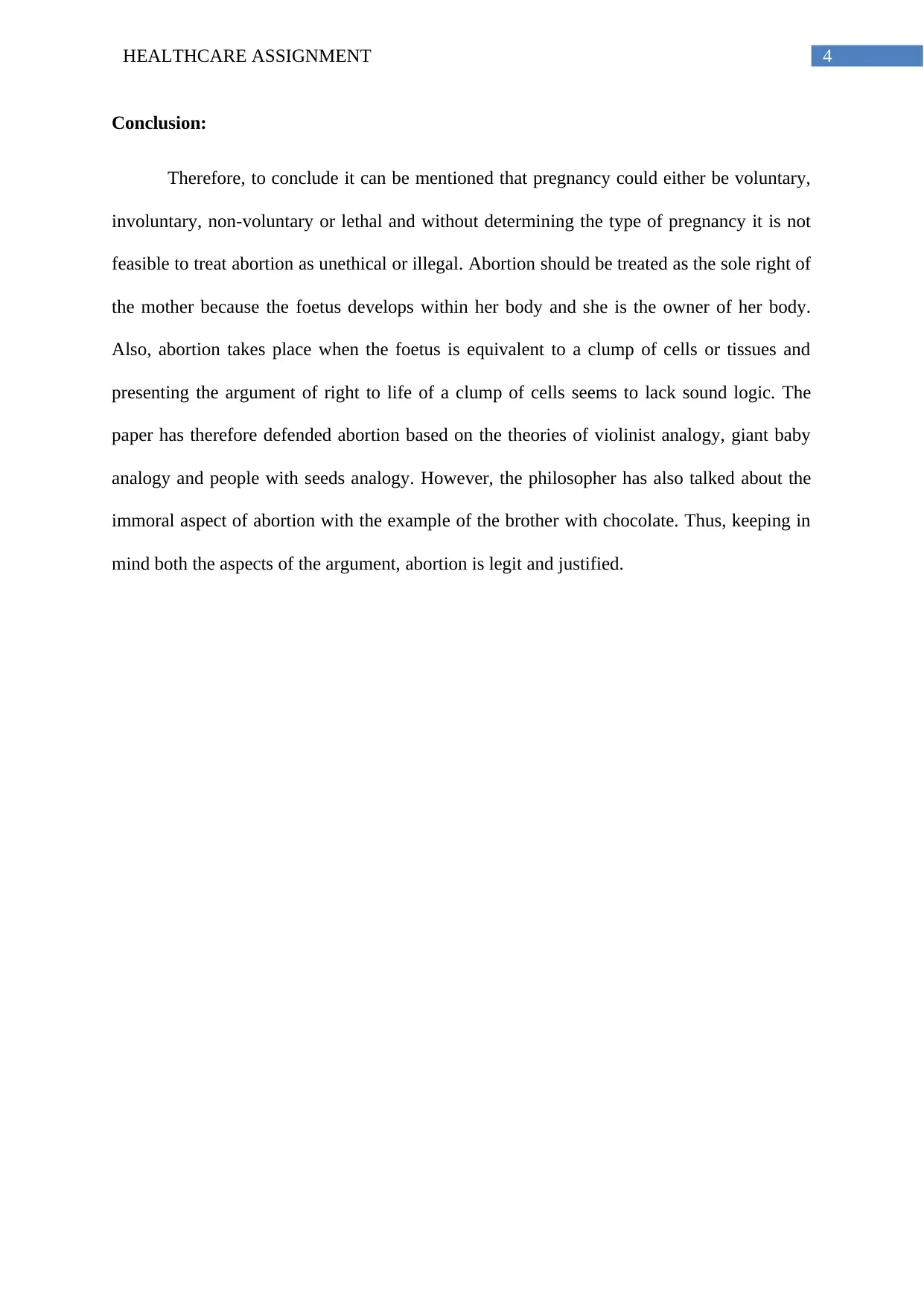
4HEALTHCARE ASSIGNMENT
Conclusion:
Therefore, to conclude it can be mentioned that pregnancy could either be voluntary,
involuntary, non-voluntary or lethal and without determining the type of pregnancy it is not
feasible to treat abortion as unethical or illegal. Abortion should be treated as the sole right of
the mother because the foetus develops within her body and she is the owner of her body.
Also, abortion takes place when the foetus is equivalent to a clump of cells or tissues and
presenting the argument of right to life of a clump of cells seems to lack sound logic. The
paper has therefore defended abortion based on the theories of violinist analogy, giant baby
analogy and people with seeds analogy. However, the philosopher has also talked about the
immoral aspect of abortion with the example of the brother with chocolate. Thus, keeping in
mind both the aspects of the argument, abortion is legit and justified.
Conclusion:
Therefore, to conclude it can be mentioned that pregnancy could either be voluntary,
involuntary, non-voluntary or lethal and without determining the type of pregnancy it is not
feasible to treat abortion as unethical or illegal. Abortion should be treated as the sole right of
the mother because the foetus develops within her body and she is the owner of her body.
Also, abortion takes place when the foetus is equivalent to a clump of cells or tissues and
presenting the argument of right to life of a clump of cells seems to lack sound logic. The
paper has therefore defended abortion based on the theories of violinist analogy, giant baby
analogy and people with seeds analogy. However, the philosopher has also talked about the
immoral aspect of abortion with the example of the brother with chocolate. Thus, keeping in
mind both the aspects of the argument, abortion is legit and justified.
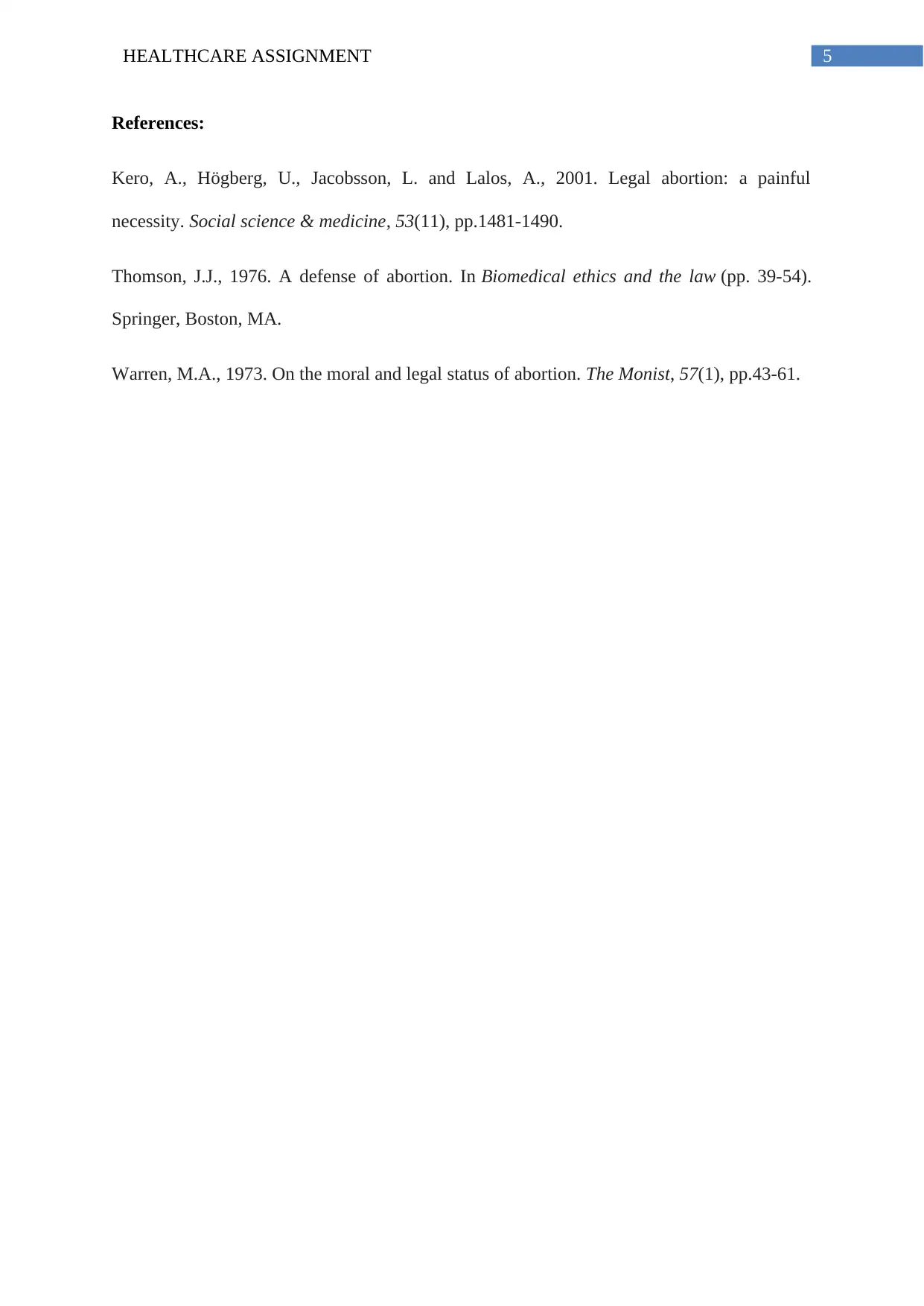
5HEALTHCARE ASSIGNMENT
References:
Kero, A., Högberg, U., Jacobsson, L. and Lalos, A., 2001. Legal abortion: a painful
necessity. Social science & medicine, 53(11), pp.1481-1490.
Thomson, J.J., 1976. A defense of abortion. In Biomedical ethics and the law (pp. 39-54).
Springer, Boston, MA.
Warren, M.A., 1973. On the moral and legal status of abortion. The Monist, 57(1), pp.43-61.
References:
Kero, A., Högberg, U., Jacobsson, L. and Lalos, A., 2001. Legal abortion: a painful
necessity. Social science & medicine, 53(11), pp.1481-1490.
Thomson, J.J., 1976. A defense of abortion. In Biomedical ethics and the law (pp. 39-54).
Springer, Boston, MA.
Warren, M.A., 1973. On the moral and legal status of abortion. The Monist, 57(1), pp.43-61.
⊘ This is a preview!⊘
Do you want full access?
Subscribe today to unlock all pages.

Trusted by 1+ million students worldwide
1 out of 6
Your All-in-One AI-Powered Toolkit for Academic Success.
+13062052269
info@desklib.com
Available 24*7 on WhatsApp / Email
![[object Object]](/_next/static/media/star-bottom.7253800d.svg)
Unlock your academic potential
Copyright © 2020–2026 A2Z Services. All Rights Reserved. Developed and managed by ZUCOL.